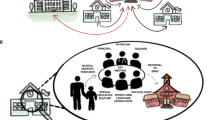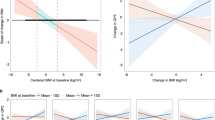Abstract
Previous reviews have documented an overall weak or uncertain association between obesity and school-based educational attainment in children and young people. However, up to half of young adults will go on to further college or university education by age 30. The study aim was to systematically review evidence on the association between obesity and tertiary education outcomes in young men and women. A search of multiple databases, including Embase, Global Health, ERIC, Medline, PsycInfo, and Science Citation Index was conducted in March 2018. Cross-sectional and longitudinal studies were included that reported on young people aged 16+, an association between obesity and academic achievement, and a comparison to healthy weight students. Risk of bias was assessed using criteria from the STROBE checklist. From 1297 records, 16 studies met all inclusion criteria. All six cross-sectional studies and 8/10 longitudinal studies reported lower educational achievement by students with obesity. All longitudinal studies were at low risk of bias but four cross-sectional studies were at medium risk and two at high risk of bias. Three of four studies showed reduced enrolment, in 6/8 graduation was less likely, and all 6 studies reporting on performance showed this was lower in those with obesity. Five of nine studies reported that obesity had a greater impact on educational achievement for women. Overall, there is compelling evidence of weight bias in that students with obesity do less well in tertiary education than their healthy weight peers. It is likely that university/college attainment is less impacted by socio-economic factors than school-based achievement. A better understanding of the processes that underpin this weight bias is needed, including stakeholder (student, staff) experiences of weight stigma, perceived or enacted. Responsive actions could mirror those to address disability or gender bias, or in health promotion in tertiary education settings.
This is a preview of subscription content, access via your institution
Access options
Subscribe to this journal
Receive 12 print issues and online access
$259.00 per year
only $21.58 per issue
Buy this article
- Purchase on Springer Link
- Instant access to full article PDF
Prices may be subject to local taxes which are calculated during checkout

Similar content being viewed by others
References
Puhl RM, Heuer CA. The stigma of obesity: a review and update. Obes. 2009;17:941–64.
Lynagh M, Cliff K, Morgan PJ. Attitudes and beliefs of nonspecialist and specialist trainee health and physical education teachers toward obese children: evidence for “anti-fat” bias. J Sch Health. 2015;85:595–603.
Zavodny M. Does weight affect children’s test scores and teacher assessments differently? Eco Educ Rev. 2013;34:135–45.
Kenney EL, Gortmaker SL, Davison KK, Bryn Austin S. The academic penalty for gaining weight: a longitudinal, change-in-change analysis of BMI and perceived academic ability in middle school students. Int J Obes. 2015;39:1408–13.
Taras H, Potts-Datema W. Obesity and student performance at school. J Sch Health. 2005;75:291–5.
Caird J, Kavanagh J, Oliver K, Oliver S, O’Mara A, Stansfield C et al. Childhood Obesity and Educational Attainment. a systematic review. EPPI-Centre report no. 1901, London; 2018.
Santana CCA, Hill JO, Azevedo LB, Gunnarsdottir T, Prado WL. The association between obesity and academic performance in youth: a systematic review. Obes Rev. 2017;18:1191–9.
Martin A, Booth JN, McGeown S, Niven A, Sproule J, Saunders DH, et al. Longitudinal associations between childhood obesity and academic achievement: systematic review with focus group data. Curr Obes Rep. 2017;6:297–313.
Organisation for Economic Co-operation and Development (OECD). Education at a glance 2017: OECD indicators. Paris: OECD Publishing; 2017.
Belfield C, Britton J, Dearden L, van der Erve J. Higher education funding in England: past, present and options for the future. London: The Institute for Fiscal Studies; 2017.
Suraya F, Meo SA, Almubarak Z, Alqaseem YA. Effect of obesity on academic grades among Saudi female medical students at College of Medicine, King Saud University: pilot study. J Pak Med Assoc. 2017;67:1266–9.
Karnehed N, Rasmussen F, Hemmingsson T, Tynelius P. Obesity and attained education: cohort study of more than 700,000 Swedish men. Obes. 2006;14:1421–8.
Cheng YA. Longer exposure to obesity, slimmer chance of college? Body weight trajectories, non-cognitive skills, and college completion. Youth Soc. 2017;49:203–27.
Benson R, von Hippel PT, Lynch JL Does more education cause lower BMI, or do lower-BMI individuals become more educated? Evidence from the National Longitudinal Survey of Youth 1979. Soc Sci Med. 2017;19. https://doi.org/10.1016/j.socscimed.2017.03.042.
von Hippel PT, Lynch JL. Why are educated adults slim—causations or selection? Soc Sci Med. 2014;105:131–9.
Fowler-Brown AG, Ngo LH, Phillips RS, Wee CC. Adolescent obesity and future college degree attainment. Obes. 2010;18:1235–41.
Gortmaker SL, Must A, Perrin JM, Sobol AM, Dietz WH. Social and economic consequences of overweight in adolescence and young adulthood. N Engl J Med. 1993;329:1008–12.
Amis J, Hussey A, Okunade A. Adolescent obesity, educational attainment, and adult earnings. Appl Econ Let. 2014;21:945–50.
Chung AE, Maslow GR, Skinner AC, Halpern CT, Perrin EM. Social, vocational, and educational outcomes of obesity in adulthood. J Gen Intern Med. 2011;26:S46.
Crosnoe R. Gender, obesity, and education. Sociol Educ. 2007;80:241–60.
Anderson AS, Good DJ. Increased body weight affects academic performance in university students. Prev Med Rep. 2017;5:220–3.
Odlaug BL, Lust K, Wimmelmann CL, Chamberlain SR, Mortensen EL, Derbyshire K, et al. Prevalence and correlates of being overweight or obese in college. Psychiat Res. 2015;227:58–64.
MacCann C, Roberts RD. Just as smart but not as successful: obese students obtain lower school grades but equivalent test scores to nonobese students. Int J Obes. 2013;37:40–6.
Canning H, Mayer J. Obesity—its possible effect on college acceptance. N Engl J Med. 1966;275:1172–4.
Franz DD, Feresu SA. The relationship between physical activity, body mass index, and academic performance and college-age students. Open J Epidemiol. 2013;3:4–11.
Sargeant JD, Blanchflower DG. Obesity and stature in adolescence and earnings in young adulthood. Arch Pediatr Adolesc Med. 1994;148:681–7.
Clarke PJ, O’Malley PM, Schulenberg JE, Lee H, Colabianchi N, Johnston LD. College expectations in high school mitigate weight gain over early adulthood: Findings from a national study of American youth. Obes. 2013;21:1321–7.
Ball K, Crawford D, Kenardy J. Longitudinal relationships among overweight, life satisfaction, and aspirations in young women. Obes Res. 2004;12:1019–30.
Andrews J, Robinson D, Hutchinson J. Closing the gap? Trends in Educational Attainment and Disadvantage. London: Education Policy Institute; 2017.
Thomson S, De Bortoli L, Buckley S PISA 2012: How Australia measures up. the PISA 2012 assessment of students’ mathematical, scientific and reading literacy. Melbourne: Australian Council for Educational Research, 2013.
Office for Fair Access (OFFA). https://www.offa.org.uk/universities-and-colleges/guidance/target-groups/. Accessed 24 May 2018.
Universities and Colleges Admissions Service (UCAS). 2017 end of cycle report. https://www.ucas.com/corporate/data-and-analysis/ucas-undergraduate-releases/ucas-undergraduate-analysis-reports/2017-end-cycle-report. Accessed 24 May 2018.
Crandall CS. Do parents discriminate against their heavyweight daughters? Pers Soc Psychol Bull. 1995;21:724–35.
van Geel M, Vedder P, Tanilon J. Are overweight and obese youths more often bullied by their peers? A meta-analysis on the correlation between weight status and bullying. Int J Obes. 2014;38:1263–7.
Neovius K, Johansson K, Kark M, Neovius M. Obesity status and sick leave: a systematic review. Obes Rev. 2009;10:17–27.
Cohen AK, Rai M, Rehkopf DH, Abrams B. Educational attainment and obesity: A systematic review. Obes Rev. 2013;14:989–1005.
Okanagan C. An international charter for health promoting universities and colleges. 2015. http://internationalhealthycampuses2015.sites.olt.ubc.ca/files/2016/01/Okanagan-Charter-January13v2.pdf. Accessed 24 May 2018.
Author information
Authors and Affiliations
Corresponding author
Ethics declarations
Conflict of interest
The authors declare that they have no conflict of interest.
Electronic supplementary material
Rights and permissions
About this article
Cite this article
Hill, A.J., Rodriguez Lopez, R. & Caterson, I.D. The relationship between obesity and tertiary education outcomes: a systematic review. Int J Obes 43, 2125–2133 (2019). https://doi.org/10.1038/s41366-018-0256-1
Received:
Revised:
Accepted:
Published:
Issue Date:
DOI: https://doi.org/10.1038/s41366-018-0256-1



